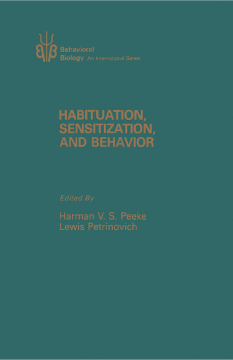
Additional Information
Book Details
Abstract
Habituation, Sensitization, and Behavior reviews some of the important advances that have been made toward understanding the mechanisms underlying, and the significance of, the phenomena traditionally associated with habituation, sensitization, and behavior in intact organisms. Habituation and sensitization are used to refer to underlying theoretical processes, and behavior changes are described at the response level.
Comprised of 12 chapters, this book begins with an overview of approaches, constructs, and terminology used in the study of response change in the intact organism. The discussion then turns to a two-factor dual-process theory of habituation and sensitization, together with a theory of the mechanism of habituation that emphasizes the assignment of responses to stimuli. Subsequent chapters explore the link between memory and habituation; statistical strategies for analyzing repeated-measures data; cellular approaches used in the analysis of habituation and sensitization in Aplysia; and intrinsic and extrinsic mechanisms of habituation and sensitization. The habituation of central nervous system evoked potentials is also considered, with particular reference to intrinsic habituation in the neocortex, allocortex, and mesencephalon. The final chapter is devoted to evolutionary determination of response likelihood and habituation.
This monograph should be of interest to practitioners in the fields of behavioral biology, psychobiology, psychology, and psychiatry.
